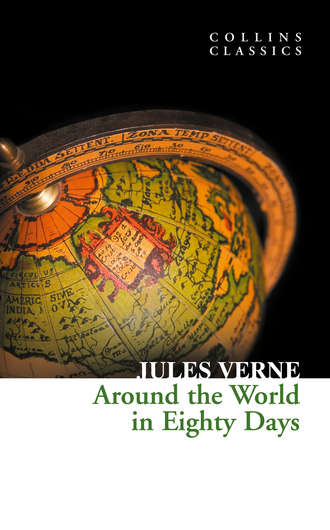
Полная версия
Around the World in Eighty Days

History of Collins
In 1819, Millworker William Collins from Glasgow, Scotland, set up a company for printing and publishing pamphlets, sermons, hymn books and prayer books. That company was Collins and was to mark the birth of HarperCollins Publishers as we know it today. The long tradition of Collins dictionary publishing can be traced back to the first dictionary William published in 1824, Greek and English Lexicon. Indeed, from 1840 onwards, he began to produce illustrated dictionaries and even obtained a licence to print and publish the Bible.
Soon after, William published the first Collins novel, Ready Reckoner, however it was the time of the Long Depression, where harvests were poor, prices were high, potato crops had failed and violence was erupting in Europe. As a result, many factories across the country were forced to close down and William chose to retire in 1846, partly due to the hardships he was facing.
Aged 30, William’s son, William II took over the business. A keen humanitarian with a warm heart and a generous spirit, William II was truly ‘Victorian’ in his outlook. He introduced new, up-to-date steam presses and published affordable editions of Shakespeare’s works and Pilgrim’s Progress, making them available to the masses for the first time. A new demand for educational books meant that success came with the publication of travel books, scientific books, encyclopaedias and dictionaries. This demand to be educated led to the later publication of atlases and Collins also held the monopoly on scripture writing at the time.
In the 1860s Collins began to expand and diversify and the idea of ‘books for the millions’ was developed. Affordable editions of classical literature were published and in 1903 Collins introduced 10 titles in their Collins Handy Illustrated Pocket Novels. These proved so popular that a few years later this had increased to an output of 50 volumes, selling nearly half a million in their year of publication. In the same year, The Everyman’s Library was also instituted, with the idea of publishing an affordable library of the most important classical works, biographies, religious and philosophical treatments, plays, poems, travel and adventure. This series eclipsed all competition at the time and the introduction of paperback books in the 1950s helped to open that market and marked a high point in the industry.
HarperCollins is and has always been a champion of the classics and the current Collins Classics series follows in this tradition – publishing classical literature that is affordable and available to all. Beautifully packaged, highly collectible and intended to be reread and enjoyed at every opportunity.
Life & Times
About the Author
Jules Verne was an unusual author as he was a French writer whose work was accepted and absorbed by the machine of English literature. Verne had invented the genres of science fiction, or ‘sci-fi’ as it is often abbreviated and there was no other English author writing on this subject at the time. Curiously Verne was thought of as an auteur pour les enfants in France. His fascination with futuristic science and fantastic situations was seen as rather puerile and fatuous alongside the serious and heavyweight novelists of his time, such as Honoré de Balzac.
In Britain it was another story. Scientific and technological progress had shaped the success of the British Empire and people were consequently far more open to Verne’s flights of fancy. He anticipated phenomena that seemed quite likely to occur from the British point of view, because they as a nation had been responsible for the lion’s share of advancements in science and technology that the world then enjoyed.
The translations of Verne’s work, however, often left something to be desired. They were heavily edited so that any perceived anti-British sentiment was erased, thus making the works unfaithful to Verne’s original manuscripts for the sake of political correctness. In addition to this political censoring, the translators had problems with transliterating measurements and calculations from metric to imperial standards. Verne had been fastidious in his scientific accuracy, thereby lending his work a weight of scientific realism and authenticity, while the translators in contrast had been rather lackadaisical in their efforts so that the precision was lost, literally, in translation. Educated and learned English readers, thinking the translations to be true, thought of Verne as a little facile, coming up with sound basic ideas but failing in his attention to detail. Even in the mid-19th century people understood the importance of research in making a novel credible.
Despite these setbacks, Verne became the ‘Father of sci-fi’ by pioneering the genre. His canon includes Voyage au Centre de la Terre (Journey to the Centre of the Earth) and Vingt Mille Lieues Sous les Mers (Twenty Thousand Leagues Under the Sea). He even anticipated space flight with De la Terre à la Lune (From the Earth to the Moon) and Autour de la Lune (Around the Moon). His modus operandi was to have a group of people embark on a journey of adventure and he wrote an incredible 54 novels using this theme, which have become known collectively as Les Voyages Extraordinaire (The Extraordinary Voyages).
These days literary types tend to look down their noses at science fiction, as if the genre is inferior to others. This is partly because of the over abundance of poorly conceived science fiction novels, but it is also due to the relative lack of characterization and exploration of human themes. While literary works tend to rely on investigating the nature of relationships and behaviour, science fiction stories pay scant attention to such topics and focus instead on the events and situations in which the characters find themselves. The same is true of thrillers, adventures and fantasies, which are often frequently accorded similar disregard.
In Victorian times, such distinctions between novel genres had yet to germinate and grow, because things were still in a stake of flux. As Verne had invented the concept of science fiction story telling, most of the work immediately influenced by him, such as that by H.G. Wells, was also of a high quality. It was really the age of pulp fiction – so called because of the throwaway nature of paperback books – that standards began to fall.
Rampant consumerism meant that substandard writers had their material go to print and so it became ever more difficult to see the wood for the trees in terms of writing quality. It became necessary to invent the term ‘literary novel’ as a badge of distinction to mark a book out as having supposedly been written by someone with a little more creative integrity than the rest.
Verne’s Prophecy
With the benefit of hindsight, we can look back at the novels of Jules Verne to analyse the extent to which his predictions came true. Verne wasn’t a dystopian science fiction writer, so he didn’t portend future catastrophes. He was more utopian in his imaginings, although curiously his stories are not set in the future as such. Instead, they are presented in a parallel world, where new sciences and technologies enable 19th-century adventurers to go about their business. They are therefore ‘science fiction’, but not strictly futuristic. The first book to take a character forwards in time was The Time Machine by H.G. Wells. Of course, the central character also travels backwards in time, to prehistory.
Verne’s agenda was really about asking the question ‘what if?’ What if people could dig to the centre of the earth, travel beneath the waves, journey to the moon or fly around the world? As a consequence, he quite logically invented the vehicles and equipment he imagined they would need. He was being pragmatic and he implemented his contemporaneous understanding of science in both designing paraphernalia and deciding what problems different environments might throw up.
As scientists did not understand earth dynamics until the latter half of the 20th century, it was conceivable at the time that one could dig to the centre of the planet, just as his characters do in Journey to the Centre of the Earth. Similarly, in From the Earth to the Moon he has his characters employing a canon to fire them to the moon. This wouldn’t work on two levels. Nevertheless, Verne did anticipate space flight, the submarine, mechanical flying machines, tunnelling machines and so on. Some of these were already in the embryonic stages of their development into operational and practical devices of course, although it is not entirely clear whether Verne knew about any of them or was genuinely basing his ideas on original thought.
No matter, for Verne was a novelist, not an inventor and his application of science and technology was all about creating the necessary illusion to make the reader believe in the adventure. By the time anyone knew any better he and his readership were consigned to history.
Visit www.AuthorTracker.com for exclusive information on your favorite HarperCollins author.
Table of Contents
Cover Page
Title Page
History of Collins
Life & Times
CHAPTER 1
CHAPTER 2
CHAPTER 3
CHAPTER 4
CHAPTER 5
CHAPTER 6
CHAPTER 7
CHAPTER 8
CHAPTER 9
CHAPTER 10
CHAPTER 11
CHAPTER 12
CHAPTER 13
CHAPTER 14
CHAPTER 15
CHAPTER 16
CHAPTER 17
CHAPTER 18
CHAPTER 19
CHAPTER 20
CHAPTER 21
CHAPTER 22
CHAPTER 23
CHAPTER 24
CHAPTER 25
CHAPTER 26
CHAPTER 27
CHAPTER 28
CHAPTER 29
CHAPTER 30
CHAPTER 31
CHAPTER 32
CHAPTER 33
CHAPTER 34
CHAPTER 35
CHAPTER 36
CHAPTER 37
CLASSIC LITERATURE: WORDS AND PHRASES adapted from the Collins English Dictionary
Copyright
About the Publisher
CHAPTER 1
In which Phileas Fogg and Passepartout accept each other—the one as Master, the other as Servant
In the year 1872, the house No. 7 Saville Row, Burlington Gardens—the house in which Sheridan died, in 1814—was inhabited by Phileas Fogg, Esq., one of the most singular and most noticed members of the Reform Club of London, although he seemed to take care to do nothing which might attract attention.
This Phileas Fogg, then, an enigmatic personage, of whom nothing was known but that he was a very polite man, and one of the most perfect gentlemen of good English society, succeeded one of the great orators that honour England.
An Englishman Phileas Fogg was surely, but perhaps not a Londoner. He was never seen on ‘Change, at the Bank, or in any of the counting-rooms of the “City.” The docks of London had never received a vessel fitted out by Phileas Fogg. This gentleman did not figure in any public body. His name had never sounded in any Inns of Court, nor in the Temple, nor Lincoln’s Inn, nor Gray’s Inn. He never pleaded in the Court of Chancery, nor the Queen’s Bench, nor the Exchequer, nor the Ecclesiastical Courts. He was neither a manufacturer, nor a trader, nor a merchant, nor a gentleman farmer. He was not a member of the Royal Institution of Great Britain, or the London Institution, or the Artisan’s Association, or the Russell Institution, or the Literary Institution of the West, or the Law Institute, or that Institute of the Arts and Sciences, placed under the direct patronage of Her Gracious Majesty. In fact, he belonged to none of the numerous societies that swarm in the capital of England, from the Harmonic to the Entomological Society, founded principally for the purpose of destroying hurtful insects.
Phileas Fogg was a member of the Reform Club, and that was all.
Should anyone be astonished that such a mysterious gentleman should be among the members of this honourable institution, we will reply that he obtained admission on the recommendation of Baring Brothers, with whom he had an open credit. Thence a certain appearance due to his cheques being regularly paid at sight by the debit of his account current, which was always to his credit.
Was this Phileas Fogg rich? Undoubtedly. But the best informed could not say how he had made his money, and Mr Fogg was the last person to whom it would have been proper to go for information. He was by no means extravagant in anything, neither was he avaricious, for when money was needed for a noble, useful, or benevolent purpose, he gave it quietly, and even anonymously. In short, no one was less communicative than this gentleman. He talked as little as possible, and seemed much more mysterious than silent. But his life was open to the light, but what he did was always so mathematically the same thing, that the imagination, unsatisfied, sought further.
Had he travelled? It was probable, for none knew the world better than he; there was no spot so secluded that he did not appear to have a special acquaintance with it. Sometimes, in a few, brief, clear words, he would correct the thousand suppositions circulating in the Club with reference to travellers lost or strayed; he pointed out the true probabilities, and so often did events justify his predictions that he seemed as if gifted with a sort of second sight. He was a man who must have travelled everywhere, in spirit at least.
One thing was certain, that for many years Phileas Fogg had not been from London. Those who had the honour of knowing him more intimately than others, affirmed that no one could pretend to have seen him elsewhere than upon the direct route, which he traversed every day to go from his house to the Club. His only pastime was reading the papers and playing whist. He frequently won at this quiet game, so very appropriate to his nature; but his winnings never went into his purse, and made an important item in his charity fund. Besides, it must be remarked, that Mr Fogg evidently played for the sake of playing, not to win. The game was for him a contest, a struggle against a difficulty; but a motionless, unwearying struggle, and that suited his character.
Phileas Fogg was not known to have either wife or children—which may happen to the most respectable people—neither relatives nor friends—which is more rare, truly. Phileas Fogg lived alone in his house in Saville Row, where nobody entered. There was never a question as to its interior. A single servant sufficed to serve him. Breakfasting and dining at the Club, at hours fixed with the utmost exactness, in the same hall, at the same table, not entertaining his colleagues nor inviting a stranger, he returned home only to go to bed, exactly at midnight, without ever making use of the comfortable chambers which the Reform Club puts at the disposal of its favoured members. Of the twenty-four hours he passed ten at his residence either sleeping or busying himself at his toilet. If he walked, it was invariably with a regular step in the entrance hall with its Mosaic floor, or in the circular gallery, above which rose a dome with blue-painted windows, supported by twenty Ionic columns of red porphyry. If he dined or breakfasted, the kitchens, the buttery, the pantry, the dairy of the Club furnished his table from their succulent stores; the waiters of the Club, grave personages in dress-coats and shoes with swanskin soles, served him in a special porcelain and on fine Saxon linen; the Club decanters of a lost mould contained his sherry, his port, and his claret, flavoured with orange flower water and cinnamon; and finally the ice of the Club, brought at great expense from the American lakes, kept his drinks in a satisfactory condition of freshness.
If to live in such conditions is to be eccentric, it must be granted that eccentricity has something good in it!
The mansion on Saville Row, without being sumptuous, recommended itself by its extreme comfort. Besides with the unvarying habits of the occupants, the number of servants was reduced to one. But Phileas Fogg demanded from his only servant an extraordinary and regular punctuality. This very day, the second of October, Phileas Fogg had dismissed James Forster—this youth having incurred his displeasure by bringing him shaving-water at eighty-four degrees Fahrenheit, instead of eighty-six—and he was waiting for his successor, who was to make his appearance between eleven and half-past eleven.
Phileas Fogg, squarely seated in his armchair, his feet close together like those of a soldier on parade, his hands resting on his knees, his body straight, his head erect, was watching the hand of the clock move—a complicated mechanism which indicated the hours, the minutes, the seconds, the days, the days of the month, and the year. At the stroke of half-past eleven Mr Fogg would, according to his daily habit, leave his house and repair to the Reform Club.
At this moment, there was a knock at the door of the small parlour in which was Phileas Fogg.
James Forster, the dismissed servant, appeared.
“The new servant,” said he.
A young man, aged thirty years, came forward and bowed.
“You are a Frenchman, and your name is John?” Phileas Fogg asked him.
“Jean, if it does not displease Monsieur,” replied the newcomer. “Jean Passepartout, a surname which has clung to me and which my natural aptitude for withdrawing from a business has justified. I believe, sir, that I am an honest fellow; but to be frank, I have had several trades. I have been a travelling singer; a circus rider, vaulting like Leotard, and dancing on the rope like Blondin; then I became professor of gymnastics, in order to render my talents more useful; and in the last place, I was a sergeant fireman at Paris. I have among my papers notes of remarkable fires. But five years have passed since I left France, and wishing to have a taste of family life, I have been a valet in England. Now, finding myself out of a situation, and having learned that Monsieur Phileas Fogg was the most exact and the most settled gentleman in the United Kingdom, I have presented myself to monsieur with the hope of living tranquilly with him, and of forgetting even the name of Passepartout.”
“Passepartout suits me,” replied the gentleman. “You are recommended to me. I have good reports concerning you. You know my conditions?”
“Yes, sir.”
“Well, what time have you?”
“Twenty-two minutes after eleven,” replied Passepartout, drawing from the depths of his pocket an enormous silver watch.
“You are slow,” said Mr Fogg.
“Pardon me, monsieur, but it is impossible.”
“You are four minutes too slow. It does not matter. It suffices to state the difference. Then, from this moment—twenty-nine minutes after eleven o’clock a.m., this Wednesday, October 2, 1872, you are in my service.”
That said, Phileas Fogg rose, took his hat in his left hand, placed it upon his head with an automatic movement, and disappeared without another word.
Passepartout heard the street door close once; it was his new master going out; then a second time; it was his predecessor, James Forster, departing in his turn. Passepartout remained alone in the house in Saville Row.
CHAPTER 2
In which Passepartout is Convinced that he has Found his ideal
“Upon my word,” said Passepartout to himself, “I have known at Madame Tussaud’s good people as lively as my new master!”
It is proper to say here that Madame Tussaud’s “good people” are wax figures, much visited in London, and who, indeed, are only wanting in speech.
During the few minutes that he had interviewed Phileas Fogg, Passepartout had examined his future master, rapidly but carefully. He was a man that might be forty years old, of fine handsome face, of tall figure, which a slight corpulence did not disparage, his hair and whiskers light, his forehead compact, without appearance of wrinkles at the temples, his face rather pale than flushed, his teeth magnificent. He appeared to possess in the highest degree what physiognomists call “repose in action,” a quality common to those who do more work than talking. Calm, phlegmatic, with a clear eye and immovable eyelid, he was the finished type of those cool-blooded Englishmen so frequently met in the United Kingdom, and whose somewhat academic posture Angelica Kauffman has marvellously reproduced under her pencil. Seen in the various acts of his existence, this gentleman gave the idea of a well-balanced being in all his parts, evenly hung, as perfect as a Leroy or Earnshaw chronometer. Indeed Phileas Fogg was exactness personified, which was seen clearly from “the expression of his feet and his hands,” for with man, as well as with the animals, the limbs themselves are organs expressive of the passions.
Phileas Fogg was one of those mathematically exact people, who, never hurried and always ready, are economical of their steps and their motions. He never made one stride too many, always going by the shortest route. He did not give an idle look. He did not allow himself a superfluous gesture. He had never been seen moved or troubled. He was a man of the least possible haste, but he always arrived in time. However, it will be understood that he lived alone, and, so to speak, outside of every social relation. He knew that in life one must take his share of friction, and as frictions retard, he never rubbed against anyone.
As for Jean, called Passepartout, a true Parisian of Paris, he had sought vainly for a master to whom he could attach himself, in the five years that he lived in England and served as a valet in London. Passepartout was not one of those Frontins or Mascarilles, who, with high shoulders, nose high in air, a look of assurance, and staring eye, are only impudent dunces. No, Passepartout was a good fellow, of amiable physiognomy, his lips a little prominent, always ready to taste or caress, a mild and serviceable being, with one of those good round heads that we like to see on the shoulders of a friend. His eyes were blue, his complexion rosy, his face fat enough for him to see his cheek-bones, his chest broad, his form full, his muscles vigorous, and he possessed a herculean strength which his youthful exercise had splendidly developed. His brown hair was somewhat tumbled. If the ancient sculptors knew eighteen ways of arranging Minerva’s hair, Passepartout knew of but one for fixing his own: three strokes of a large tooth-comb, and it was dressed.
The most meagre stock of prudence would not permit of saying that the expansive character of this young man would agree with that of Phileas Fogg. Would Passepartout be in all respects exactly the servant that his master needed? That would only be seen by using him. After having had, as we have seen, quite a wandering youth, he longed for repose. Having heard the exactness and proverbial coolness of the English gentlemen praised, he came to seek his fortune in England. But until the present, Fate had treated him badly. He had not been able to take root anywhere. He had served in ten different houses. In every one the people were capricious and irregular, running after adventures or about the country—which no longer suited Passepartout. His last master, young Lord Longsferry, Member of Parliament, after having passed his nights in the Haymarket oyster rooms, returned home too frequently on the shoulders of policemen. Passepartout wishing, above all things, to be able to respect his master, ventured some mild remarks, which were badly received, and he left. In the meantime, he learned that Phileas Fogg, Esq., was hunting for a servant. He made some inquiry about this gentleman. A person whose existence was so regular, who never slept in a strange bed, who did not travel, who was never absent, not even for a day, could not but suit him. He presented himself, and was accepted under the circumstances that we already know.








